Round-up of 16t trailer options and prices
Go back 20 years or so and buying a new trailer was a pretty simple task. You looked for a bog-standard item that could hold 12t or so, had a set of fairly crude farm-spec axles, some super-single tyres and the minimum of extras.
Now it’s all very different. You are looking for something that will meet both the current regulations and the upcoming ones – including the impending trailer MOT – and won’t break the bank, either.
See also: Tractors on the road: Rights, wrongs, rules and regulations
So, what’s on offer from the manufacturers and what sort of prices are we talking about? We asked half-a-dozen manufacturers what kit they think you need and how much it costs.
To keep things simple, we’ve mostly looked at 16t models. That’s what most farmers seem to be aiming at, simply because they can take two tankfuls from most current combines without a rookie driver dropping an embarrassing heap on the ground in front or behind the trailer.
Prices go from £16,000 to £25,000. That may look like a wide range, but the final price obviously depends on how generous a spec you are after and how hard a deal you strike.
Bailey
Bailey Trailers’ TB range goes from 4t right up to 24t, with 10-stud axles from 11t upwards. A 16t version weighs in at 5,250kg and is typically shod with 385/65 R22.5 tyres, while heavy-duty axles are standard on tandem springs.
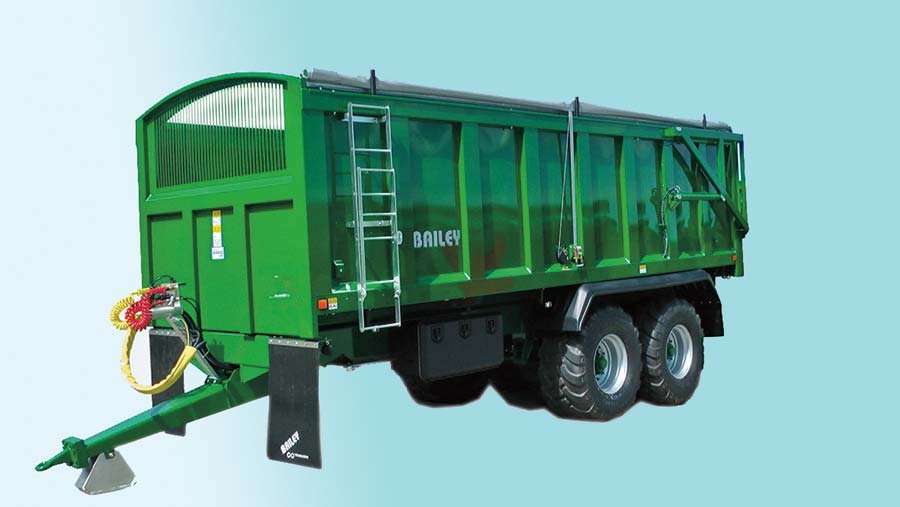
Some 80-90% of trailers sold have 10-stud high-speed axles, says the company, and bigger tyres such as Michelin’s CargoXBib and Nokian 560-60 are getting more popular.
Starting price is about £17,500 and a sprung drawbar and hydraulic rear door are included in the price. Air brakes with load sensing and a shunt valve adds another £1,300, while you will have to dig out another £1,300 for ABS brakes.
Side ladders are fitted as standard and the hydraulic rear door has a lock-valve to keep it tightly closed when the trailer is in the down position. A manual rollover sheet costs £1,400.
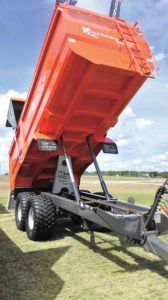 K-Two
K-Two
Buckinghamshire firm K-Two started making trailers back in 2000 and now sells about 100 Roadeo haulers each year. All are fitted with commercial ADR axles and 560-60 flotation tyres are the most popular choice, says the firm’s Terry Kelloway.
The days of super-single tyres are fast drawing to a close, he says. Rewind 10 years and 90% of trailers wore them, but K-Two has dealt with just one request for super-single rubber in the past year.
Both 14t and 16t models sell well, he adds, and 80% of buyers opt for air-brakes. All models in this sector have sprung drawbars, but rollover covers account for just 5% of trailers.
Book price of a 16 trailer with 560-60 floatation rubber is about £23,500, but you can expect to pay closer to £16,000.
Krampe UK
Home-grown trailer-makers may have a big chunk of the market, but Irish and Continental brands are beginning to flex their muscles, too.
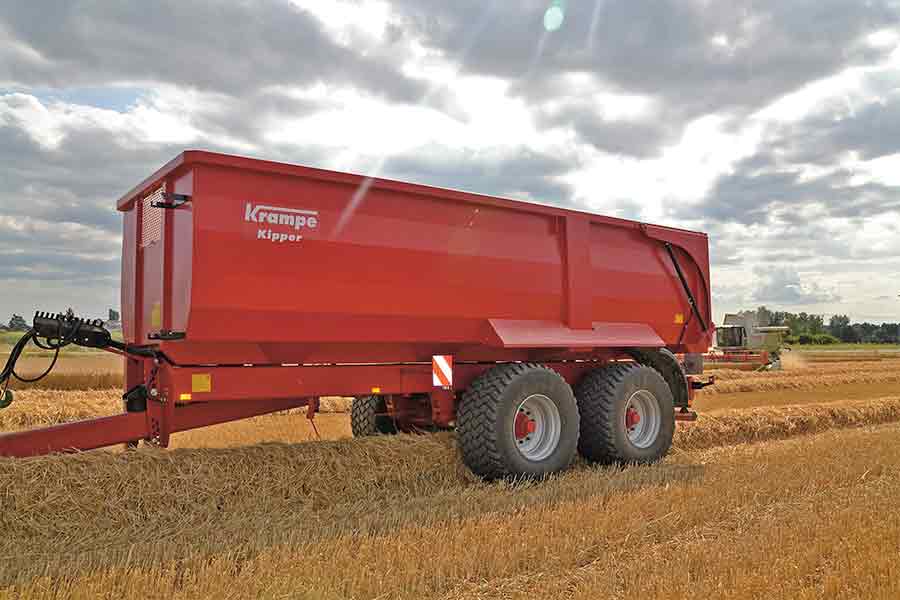
French maker Rolland has been selling trailers in the UK for some time, as have several Irish makers such as Kane and Smythe, while German manufacturers Fliegl and Krampe have both shown at Lamma and Cereals.
Stuart Cameron at Continental Soil Technology at Tetbury in Gloucestershire says it has sold six Krampe 16t grain trailers in the UK this year. The asking price looks a bit higher than some of the other makes, but you get a lot of kit for your money, he says.
Prices are about £18,000-£20,000 for a Krampe Big Body 650.
Components are predictably chunky, with wide-spaced 600-55 R26.5 tyres and a single, substantial ram mounted on a strong-looking gimbal.
Larrington
Richard Larrington at Boston, Lincolnshire, is another company that has noticed the preference for bigger trailers, with many farmers deciding to jump straight from 12t capacity to a 18t model.
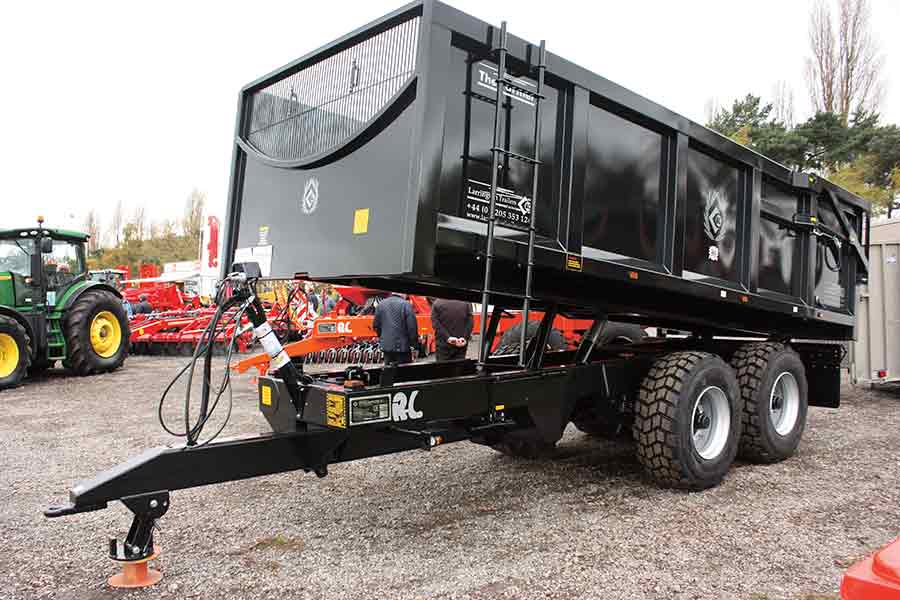
Trailer tyres are also being upscaled from the more usual 560-60 R22.5 size to beefed-up 580-60 22.5 rubber.
In fact, one 20t trailer exported to Holland was shod on 620-50 26.5 tyres at a cost of £1,400 for a set of four.
Mr Larrington points out there is still a place for crossplies, as long as journeys are short. Long hikes, on the other hand, can cause the tyres to overheat and shorten their service lives.
What proportion of farmers are going for air brakes? About 99%, he reckons, with only a few die-hards sticking to old-school hydraulic anchors. An 18-tonner will cost about £18,000.
Richard Western
Richard Western has been making trailers at Woodbridge, Suffolk, since 1971. Sales manager Mike Murray says he is noticing a steady move to 16t and 18t grain trailers, and even up to 20t for trailers used for carting maize to biogas plants.
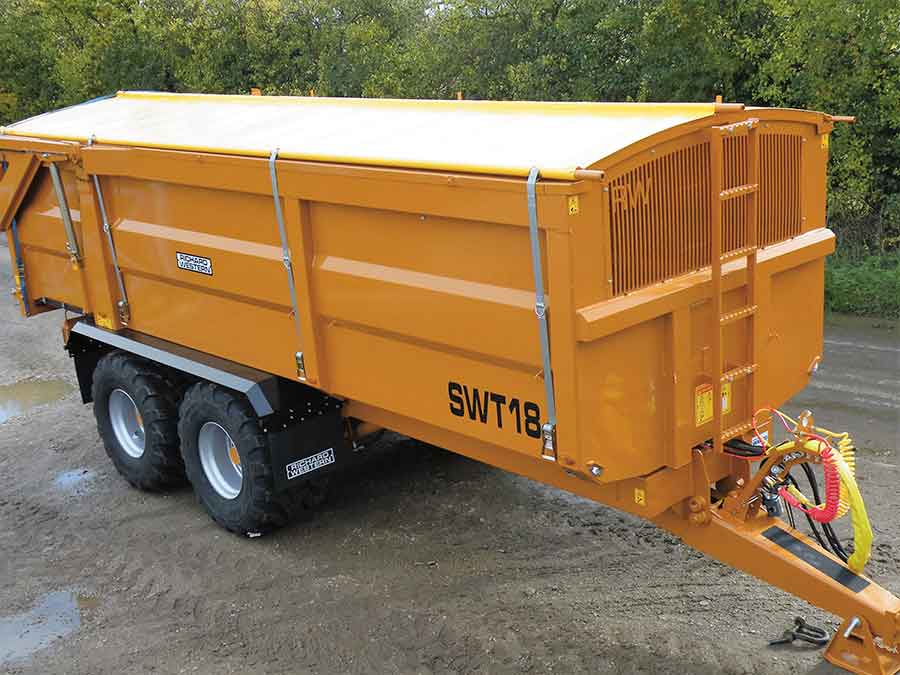
The SF14HS is Western’s pukka version with hydraulic tailgates, sprung drawbars, mudguards and LED lights all now standard gear, while the LX-badged models give buyers a chance to trim the budget a little.
When it comes to rubberware, 560-60 R22.5s are the most common choice of traction, but farmers and contractors are increasingly opting for bigger 580-65 22.5s at an extra cost of about £1,200. The jump from 560 to 580 tyres gives a surprisingly big benefit in carrying capacity, he says, with a 560-60 capable of carrying 4,625kg on each wheel, compared with 5,300kg on the larger 580.
Typical retail cost? About £20,000 to £25,000 with a rollover sheet.
Stewart
Scottish trailer-maker Stewart offers a 16t GX1621 for £13,500 and a Pro Series body with Hardox higher-strength steel used to save weight for an extra £1,500.
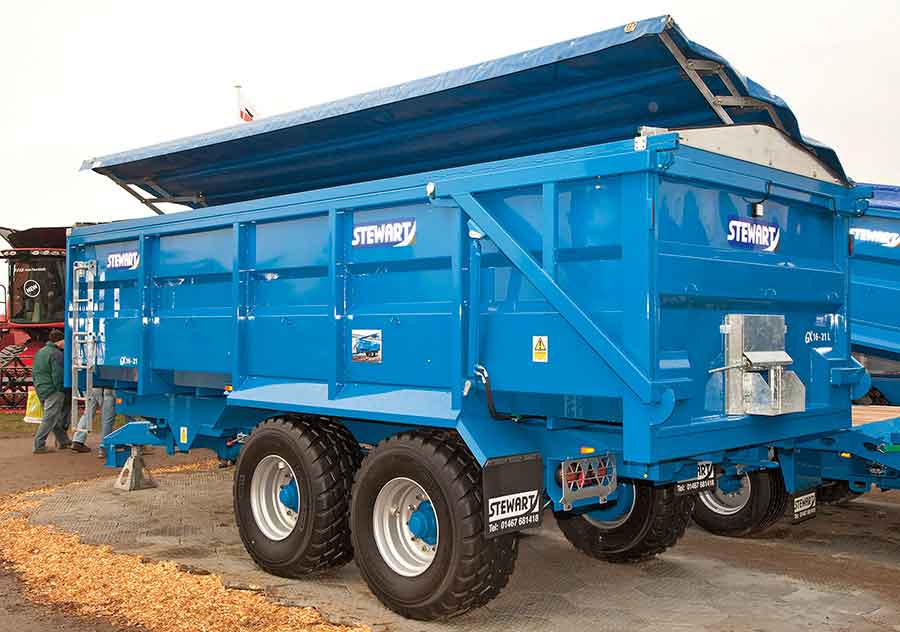
Standard equipment includes a sprung drawbar, mudwings, spray flaps, LED lights, galvanised light guards, hydraulic door, two-pack paint, ratchet parking brake and radial tyres for durability.
Warwick
Warwick has been making trailers at Alresford in Hampshire since 1958, with a range that goes from 9-20t. All models from 12t upwards get commercial-spec running gear with 10-stud hubs and s-cam brakes.
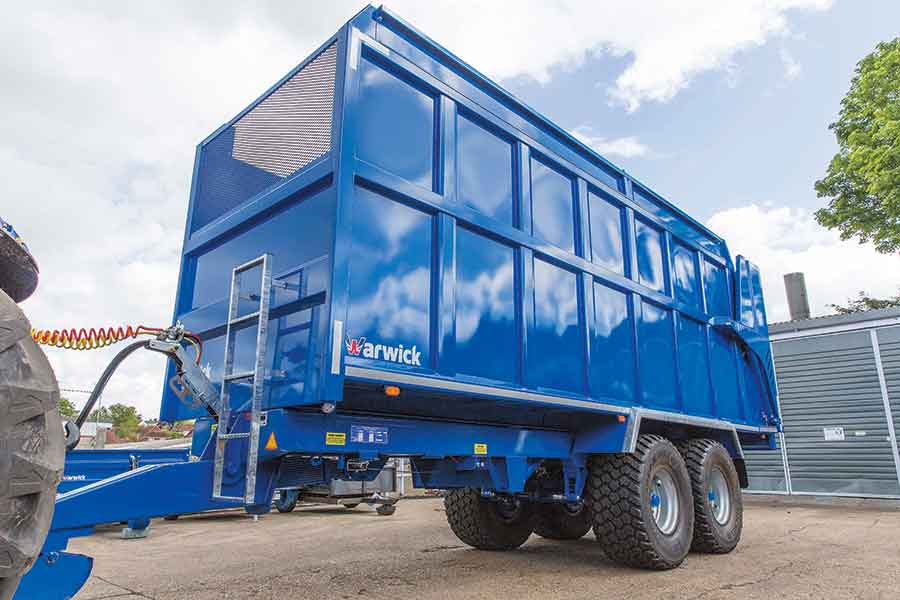
Warwick is unusual in having its own VOSA-certified testing equipment and farmers can bring their own trailers for a check-up at a cost of £175 a go.
Managing director Chris Jones says many local contractors have been using their facilities for some while, but there is increasing demand from farmers who want the peace of mind of knowing their kit is up to scratch, too.
A 16t full-spec Warwick trailer with all the kit, including airbrakes, ABS, weighing system and rollover sheet, comes with a £20,000 ticket price, says Mr Jones. However, for budget-conscious buyers there are versions around the £15,000-£16,000 mark.
Wondering about weights?
Still a bit confused about how much weight you can legally have in a trailer on the road? You are not alone.
Take the weight of the trailer itself (typically 6.5t), add a good load of wheat (16t) and you have a total of 22.5t. Add the weight of a tractor that’s man enough to pull it (8.5t) and you have a grand total of 31t.
However, despite an increase to a gross train weight of 31t just over a year ago, it is important to remember the maximum laden weight of trailers themselves remained the same at 18.29t.
So, if you add the weight of the wheat (16t) and the weight of the trailer (6.5t), you still get a total of 22.5t, which is somewhat adrift of the max 18.29t figure you’re allowed.
The recent increase to 31t was a definite improvement on the 24.39t maximum that was in place and allows a heavier and safer tractor up front, but for this harvest we are not yet at the weights we need.
A survey by the National Association of Agricultural Contractors in 2015 showed almost 60% of contractors who responded had tractor-and-trailer combinations that, if fully laden, would weigh more than 31t.
So there is no disputing the need for an update to bring the law closer to the reality of the market.
Does it matter if tractors and trailers are currently a bit over the weight limit? In the past, few police forces had the manpower (or the technical knowledge of the rules and regs) to pull tractors over.
However, that could change if the police take a tougher stance and begin issuing heavier fines. Not to mention the trouble you could be in if your vehicle is involved in an accident.

